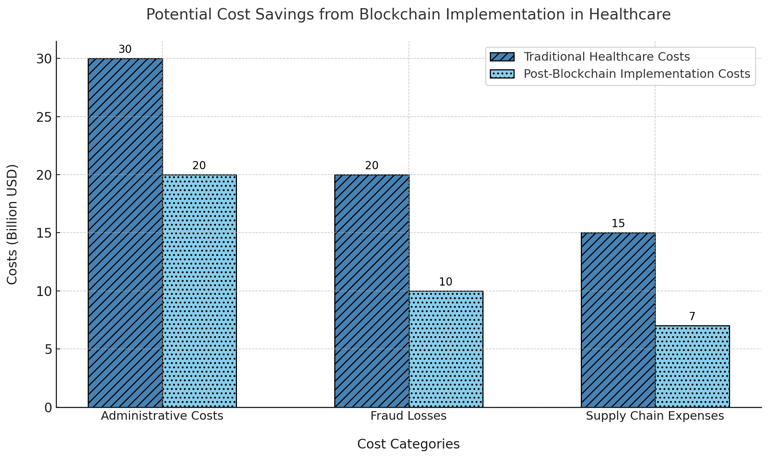How Blockchain is Transforming Healthcare: Benefits and Future Potential
Discover how blockchain technology is revolutionizing the healthcare industry by enhancing cost efficiency, transparency, and patient access. Explore its potential benefits, including secure data sharing and streamlined procurement processes, as well as the future of blockchain integration in healthcare services.
VITANIA SOLUTIONS
9/26/20243 min read


This article is an original piece by VITANIA SOLUTIONS.
Blockchain technology, initially developed for cryptocurrency transactions, is now making significant inroads into the healthcare industry. By enabling transparent, secure, and efficient systems for managing transactions, data sharing, and device procurement, blockchain is poised to revolutionize healthcare services.
Visual Overview of Blockchain in Healthcare
The following chart provides a visual representation of the potential cost savings from blockchain implementation across different cost categories in healthcare. The bars in dark blue represent traditional healthcare costs, while the light blue bars indicate the post-blockchain implementation costs, showcasing the efficiency blockchain could bring to the healthcare sector.
Below is a conceptual bar chart illustrating potential cost savings across categories such as administrative costs, fraud losses, and supply chain expenses.
Benefits of Blockchain in Healthcare
1. Cost Efficiency
Blockchain has the potential to reduce unnecessary intermediaries in healthcare transactions, leading to significant cost savings. By streamlining administrative processes and enabling direct interactions between suppliers, providers, and patients, operational costs can be lowered. This efficiency can translate into more affordable healthcare services for patients.
According to a report by Deloitte, implementing blockchain could save the healthcare industry up to $100 billion annually by 2025 through enhanced data management and reduced fraud1.
2. Transparency and Data Security
The decentralized nature of blockchain ensures that all transactions are secure and transparent. This technology allows for real-time tracking and verification, providing healthcare providers and regulators with access to accurate, immutable data. Enhanced data security reduces the risk of breaches, helping maintain compliance with regulations such as the Health Insurance Portability and Accountability Act (HIPAA) in the United States.
A study published in the International Journal of Medical Informatics highlights that blockchain can significantly reduce data tampering and unauthorized access2.
3. Improved Patient Access and Affordability
By simplifying the transaction chain, blockchain can make healthcare services more accessible and affordable. Patients benefit from reduced fees for medical treatments and devices due to the elimination of unnecessary intermediaries. This increased affordability can improve patient access to necessary healthcare services.
VITANIA SOLUTIONS’ Expert Insights on Blockchain for Healthcare
As a consulting company, Vitania Solutions offers exclusive insights to help healthcare organizations leverage blockchain technology effectively. Here are several areas where Vitania Solutions provides essential guidance:
Industry Insights & Market Analysis: With deep research into healthcare trends and blockchain technology, VITANIA SOLUTIONS helps organizations stay on top of market changes, offering competitive analysis and strategic insights.
Operational Optimization: VITANIA SOLUTIONS provides process improvement frameworks, helping healthcare providers streamline procurement, administrative tasks, and compliance through blockchain integration.
Data Security & Compliance: Leveraging industry best practices, VITANIA SOLUTIONS advises on data security protocols and HIPAA compliance, offering tools for managing patient data securely on a blockchain.
Cost Optimization: With expertise in blockchain’s cost-saving potential, VITANIA SOLUTIONS supports clients in reducing operational costs by eliminating intermediaries and fraud in supply chain transactions.
Patient Experience: VITANIA SOLUTIONS assists healthcare providers in enhancing patient access and affordability through blockchain, ensuring efficient patient data handling and cost-effective service delivery.
The Future of Blockchain in Healthcare
The integration of blockchain into healthcare is just beginning, but its potential to transform the industry is immense. Future applications may include:
Secure Patient Data Management: Enabling patients to have more control over their medical records, securely sharing data with providers as needed.
Supply Chain Management: Enhancing the traceability of pharmaceuticals and medical devices, reducing counterfeit products in the market.
Clinical Trials and Research: Improving the integrity of clinical trial data, ensuring transparency and trust in research findings.
The World Health Organization is exploring blockchain to improve the accuracy of health data reporting, which could be crucial during global health crises3.
Blockchain presents an innovative solution for modern healthcare challenges. Its ability to reduce costs while improving transparency and efficiency makes it a powerful tool for healthcare providers, governments, and patients alike. As adoption grows, blockchain is poised to drive further advancements in healthcare delivery and accessibility.
References
By integrating blockchain technology, the healthcare industry stands on the cusp of a transformation that promises enhanced security, efficiency, and patient empowerment.
Deloitte. (2016). Blockchain: Opportunities for Health Care. Retrieved from Deloitte Insights.
Agbo, C. C., Mahmoud, Q. H., & Eklund, J. M. (2019). Blockchain Technology in Healthcare: A Systematic Review. International Journal of Medical Informatics, 127, 62-75.
World Health Organization. (2020). Blockchain Technology and Health. Retrieved from WHO Publications.


